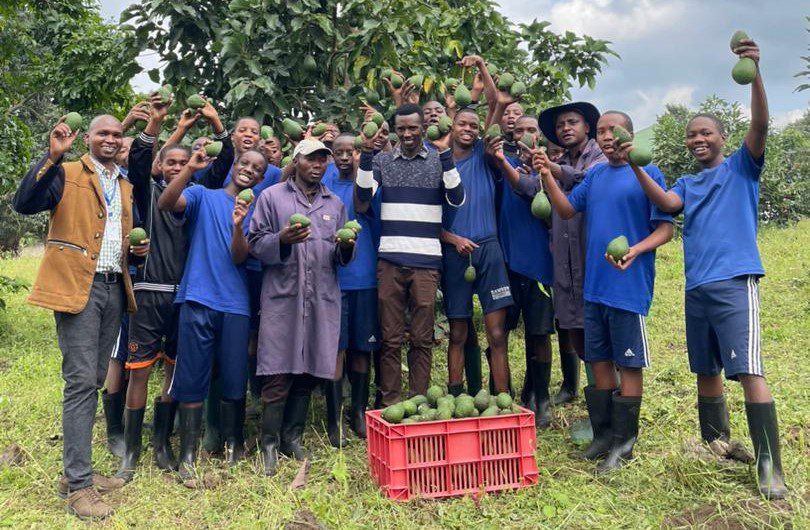
Agriculture is the backbone of Tanzania's economy. Contributing roughly 30% of the country's GDP, the agriculture sector sustains the livelihood of about 65% of the population who depends on it directly and indirectly. This is why farming is an important part of the culture and widely celebrated by Tanzanians, especially on Farmer's Day, more popularly known by its Kiswahili name, "Nane Nane."
Etymology
Nane Nane [Nah-nay Nah-nay]
Noun
The word Nane Nane is of Kiswahili origin, Tanzania's national language. The word "Nane" means "eight" in Kiswahili; thus, the term, in English, means "eight eight."
The name of this national holiday is a direct reference to the date when it is held, on every 8th of August (the eighth month). The celebrations also take eight days as agricultural fairs are organised in key locations nationwide from August 1 onwards and culminating on the day of the national holiday.
History
Nane Nane Day dates back to the early years of Tanzanian independence in 1961. It started as a small-scale farmers' celebration in rural areas, growing over the years to become a national event. The Tanzanian government officially recognised Nane Nane as a public holiday in the 1990s.
Activities
Nane Nane celebrations are marked by agricultural exhibitions with farmers, agricultural experts, and other stakeholders showcasing their products, innovations, and technologies. These exhibitions are held in various regional centres across the country, with the largest typically being in Dodoma, Tanzania's capital city. In Arusha, the place where the exhibition grounds for Farmers' Day are located, has become popularly known as Nane Nane.
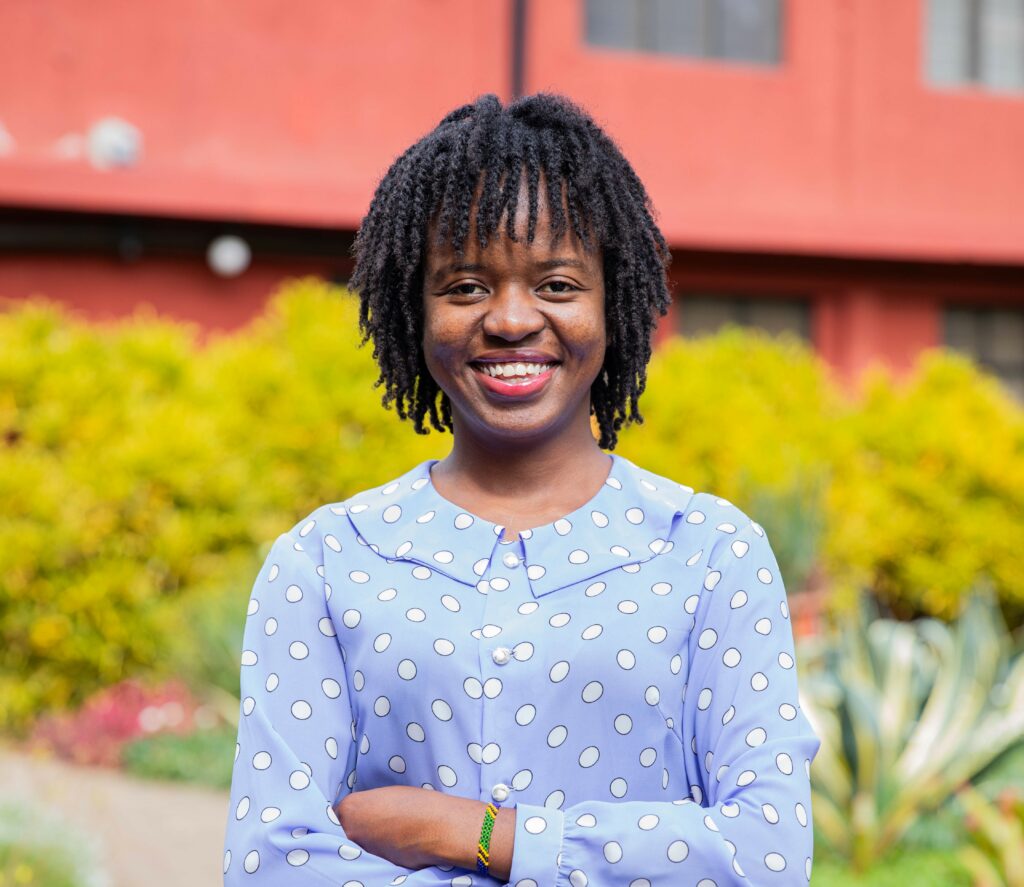
At St Jude’s, we love visitors! This is why we have a dedicated Visitors team to ensure everyone who visits the school has the best experience. If you visit St Jude’s, you’ll most likely be greeted by Maria, a St Jude’s alum currently working with the team. Learn what it’s like to visit the school and see how we fight poverty through education.
What do you usually do as part of the Visitors team?
In a sentence, our work is to give our visitors a fulfilling experience of the school, the Tanzanian culture, and life in Arusha, Tanzania. We tailor each visitor’s itinerary to meet their needs and expectations throughout their time with us. This involves quite a bit of planning and coordination with other teams within the school to ensure a personalised and holistic experience.
What does a typical visit to St Jude’s include?
The school tour is always fun. St Jude’s has a rich history, being over 20 years old, so there is a lot to explore! Other activities may include sitting in on a class with students, such as a music or art class, attending a school assembly, cooking lessons, playing sports with the students during an extracurricular activity, and much more.
Longer itineraries may include a visit to the Maasai Boma, which is a rich cultural experience, a coffee tour, and a visit to a student’s home.
What is a favourite activity for visitors at St Jude’s?
Home visits are usually the highlight for most visitors. This is when a visitor can experience the life of our students by visiting one of their families. It really helps visitors connect with our mission of fighting poverty through education.
Other favourite activities include tours of our on-campus art gallery and classroom sessions.
How does it feel coming back to St Jude’s?
It feels great to be back! I graduated from St Jude’s in 2016, and it’s inspiring to see how far we’ve come. Showing visitors around the classes and places where I used to study brings back a lot of memories and gratitude.
As an alum, some students look up to me for inspiration, so I always strive to be a good example.
How can people visit St Jude’s?
Just send us an email! We are happy to help plan your itinerary to ensure you have the best experience with us. We accept overnight, day, and even drop-in visitors. So, even if you are just passing through Arusha and only have a few hours to spare, we’d be happy to show you around!
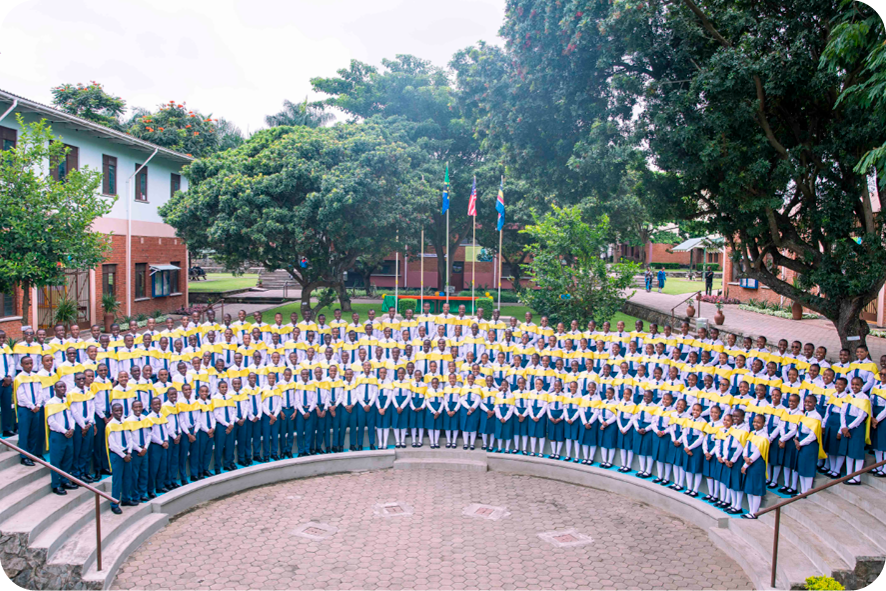
mahafali /mah-hah-fah-lee/ noun
Definition
"Mahafali" is a Kiswahili word that means "graduation" in English. It typically refers to a gathering of people to celebrate an achievement, often related to education.
"Mahafali" is of Arabic origin, derived from "Mahfal," which means "gathering" or "assembly." The adoption of this word into Kiswahili highlights the historical influence of Arabic on the language, particularly due to trade and cultural exchanges along the East African coast in the 8th to 19th centuries.
The use of "mahafali" in Kiswahili aligns with the cultural importance of educational milestones and the ceremonies associated with them. It signifies the completion of academic requirements and a communal celebration of achievement and progress.

Mrs Strobel visited The School of St Jude for the first time during the summer of 2017 and she immediately fell in love with the school.
“The visit created a lasting impression on me,” she recalls. “Although I had already heard plenty of good things about the school, nothing could prepare me for the wonderful experience of this place. I knew I had to come back,” she adds.
Two years later, Mrs Strobel returned to St Jude’s with a team of students and staff from Culver Academies, a boarding school in the United States, in what would mark the beginning of a promising and fruitful partnership between the two schools.
This year Mrs Strobel made her third visit to St Jude’s and she did not come alone.

“I was thrilled to once again bring students and colleagues from my school, Culver Academies,” she says excitedly. “It was a large group of 19 students, for all of whom it was their first time at St Jude’s, and four adults including my husband,” she adds.
In the months and weeks leading up to the visit, Mrs Strobel corresponded with the Visitors team at St Jude’s to arrange a suitable itinerary for the group.
“As the team leader of a large group of students, it can be quite challenging to plan and organise a successful trip,” shares Mrs Strobel. “Luckily, the Visitors team was more than equipped to handle all our requests and were even flexible to make additional adjustments to enhance our experience,” she adds.
The team from Culver Academies spent two weeks at St Jude’s, participating in the day-to-day activities with St Jude’s students including sports, extracurricular activities, cooking lessons, and others.
“It was a truly immersive experience,” says Alexandria, one of the students from Culver Academies. “We would start our day with students as they arrive at school in the buses, and be with them when they board the buses back home. It was inspiring to see how everyone takes pride in their tasks – from studying hard in class to their school chores,” she explains.

Another exciting experience at St Jude’s was a friendly sports competition between Culver Academies and St Jude’s students.
“The Visitors team helped organise a football and a volleyball match between us and St Jude’s after school hours,” says Faith, one of the students from Culver Academies. “It was interesting to experience a bit of competition and sportsmanship between our two schools because we are very much alike,” she adds.
The group was part of Culver’s Leadership Committee for Africa (LCA), a student-run organisation which works with other organisations in Africa to financially support programs that promote health, welfare, education, and advancement of women and children, and provide opportunities for students to learn and excel.
“We currently support three organisations in Africa through LCA, and St Jude’s is one of them,” says Faith, one of the student leaders of LCA. “Being a student-led program, we organise our own fundraising programs and activities to financially support our partner organisations,” she adds.
Faith and her team fund LCA’s mission through community fundraisers where they would routinely sell treats such as popcorn and candy for charity at social and sports events. Another popular fundraising strategy is by leveraging the competitive nature of the school environment.
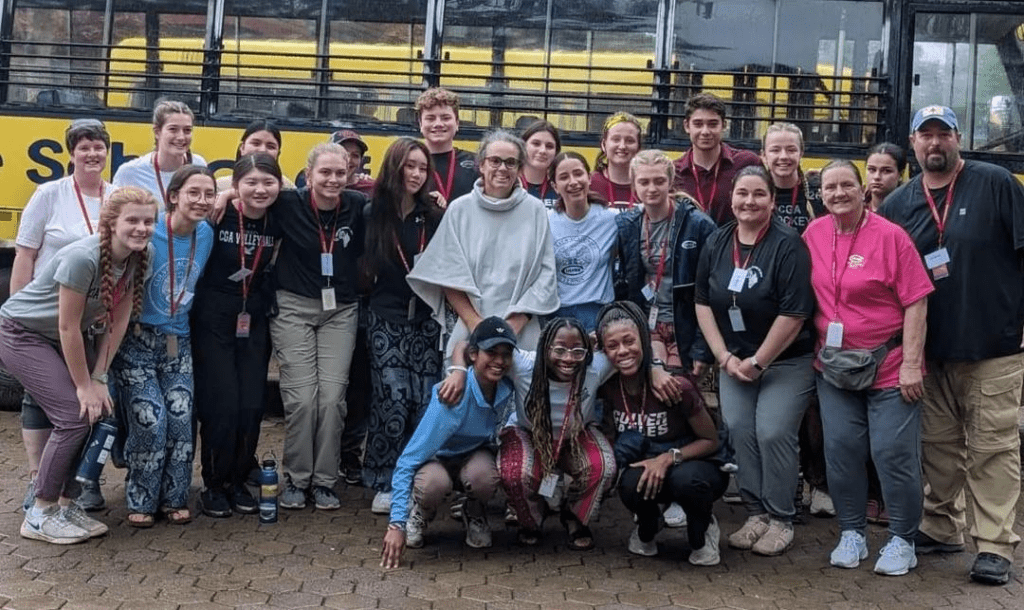
“Like St Jude’s, Culver Academies is also a boarding school and students are grouped into smaller communities called Dorms and Barracks, which is similar to the House system here at St Jude’s,” explains Alexandria who is also one of the student leaders of LCA. “Naturally, there is plenty of competition between different Dorms. So, there is a system in which a Dorm can earn an extra point when one of its members donates a penny to a good cause. This brings in a lot of healthy competition,” she adds.
Every year, the Visitors team organises exciting activities to give visitors a unique and memorable experience at St Jude’s and Tanzania. As a team that is passionate about providing an immersive St Jude’s experience to our visitors, they are living up the phrase ‘We Love Visitors’.
“We love visitors!” It’s impossible to miss the blue words emblazoned on the back of the bright yellow school buses belonging to The School of St Jude in Arusha, Tanzania.
It’s also impossible not to feel welcome from the moment you set foot on the Sisia Campus in Moshono. We arrived at St Jude’s halfway through our daughter Kate’s two-year tenure there in the Marketing team.
Our guide for our four-day visit is Frank, a fresh St Jude’s graduate undertaking a year-long internship with the Visitor Team as part of his Community Service Year, before commencing university. His first-hand experience makes him an authentic and invested host.
On day one, Frank gives us a tour of the primary campus, situated below stunning Mount Meru, Tanzania’s second highest mountain. It’s jacaranda time and in the morning, the students grab brooms and willingly help to sweep up the purple-carpet playground. Australian students would never embrace a task with such enthusiasm.
On entering a grade four music class, we are greeted with a loud, unified chorus of, “we love visitors” and I find myself learning some drumming alongside a couple of eager 11 year-olds. With more than 1,000 visitors per year, we’re not a novelty; yet we are received with warmth and grace.
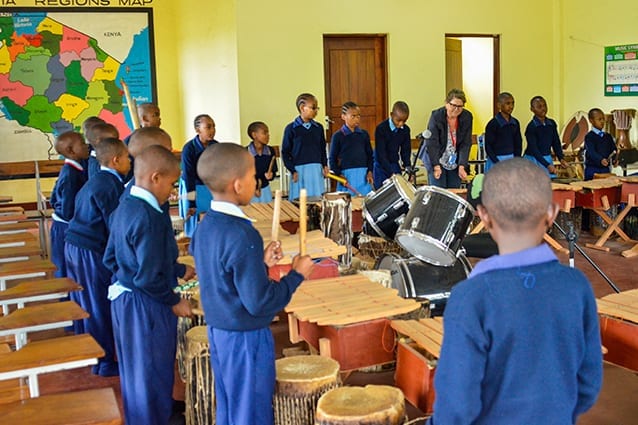
One afternoon, we take the school bus to visit the home of Justina, a Standard 5 student who lives with her older sister and father. We enter a single windowed room inside a basic brick compound, furnished with one double bed, a sofa, a coffee table and assorted possessions in stacked boxes against the wall. I foolishly think this is just one room of a larger house. Not so. This room is the sum total of their existence. There is no power, no running water and a kerosene burner for cooking.
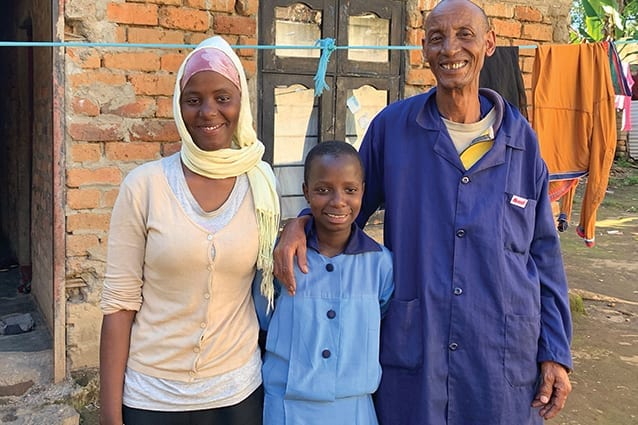
“How has being at St Jude’s changed Justina?” I ask her father, a cobbler.
“Justina is doing so well, she really wants to learn and now she wants to be a teacher,” he responds, his eyes shining with pride.
I am overwhelmed by this home visit. It reiterates the work St Jude’s is doing: taking the poorest children with the brightest minds and educating them free of charge in order to fight poverty and create the leaders of tomorrow.
We leave the family with a customary St Jude’s care package, to assist with some basic living needs including laundry soap, rice, flour, sugar, tea and a solar powered lamp. It is the least we can do. The best we can do though, is to sponsor Justina’s scholarship for her remaining school years.
On our second day, we travel the 25km on the yellow bus out to the secondary school at Usa River, known as Smith Campus. Reminiscent of an American college campus, Smith is seriously impressive. It boasts a large library, computer labs, art room, well-kept sports fields and a farm, which supplies some of the vegetables for the 3,400 meals served daily across both of the campuses.
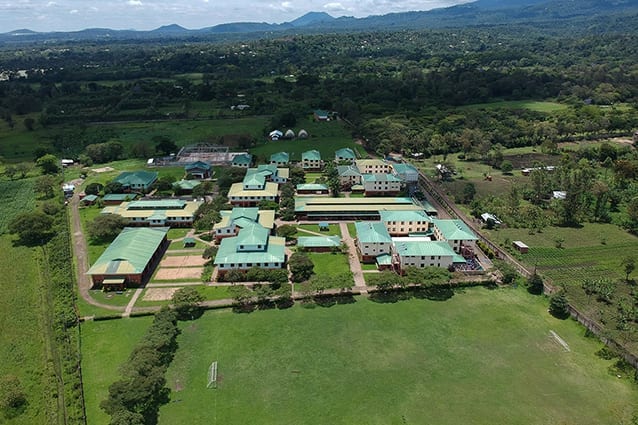
Importantly, our visitor experience is not confined to within the school gates. Frank takes us to visit a nearby government school where we meet another St Jude’s intern who is volunteer teaching English as part of his Community Service Year. The contrast is confronting: blackboards with peeling paint, 40 plus children in each class, and a library with tattered World Book encyclopedias from the 1970s. It highlighted the real life situation for the majority of Tanzanian students. A Tanzanian adult averages only 5.8 years of schooling.
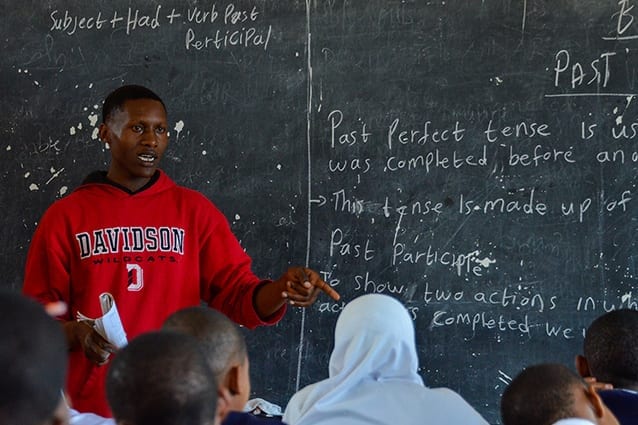
St Jude’s was named after the patron saint of hopeless causes. Our visitor experience left us believing that this cause could not be any more hopeful.
P.S. On arriving home, we formalised our sponsorship arrangement and are looking forward to hearing about Justina’s progress as she continues her education.
We love visitors! You too can have the experience of a life-time by visiting St Jude’s. Visit our website for more information.
Rickson has always enjoyed putting himself in other people’s shoes.
When he was a little boy, he and his brother Reuben would escape to a room in their house which housed their father’s tools and, mimicking their Dad, they’d pretend to fix household objects.
Now, the 21-year-old gets to fulfil his passion for learning about others as an intern with the St Jude’s Visitor Team as part of his Community Service Year. Every day he meets different people from different parts of the world who visit St Jude’s.
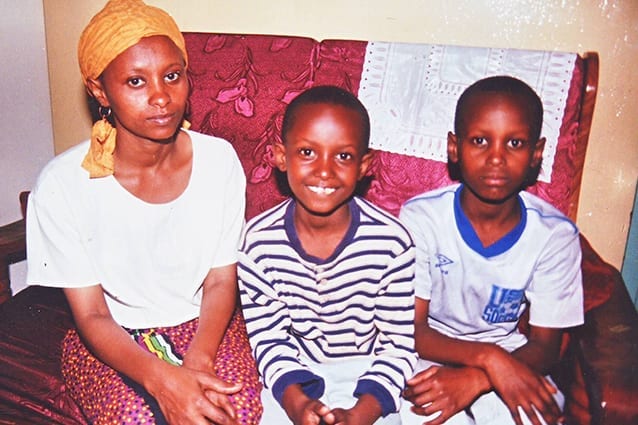
“I love to know what’s in people’s heads. Hearing other peoples’ experiences helps me to understand more than what I have seen or done myself,” he says.
For 12 years, Rickson attended St Jude’s and graduated in May 2019. When Rickson first started school, his mother, Neema, put together a ‘wish box’. Every morning before school, she would ask Rickson and Reuben to write down a wish they had for the day.
“I would always put down that I wanted to be top of my class in academics,” says Rickson.
After the family had finished dinner and watched the news, Neema would sit down with her sons and read out their wishes.
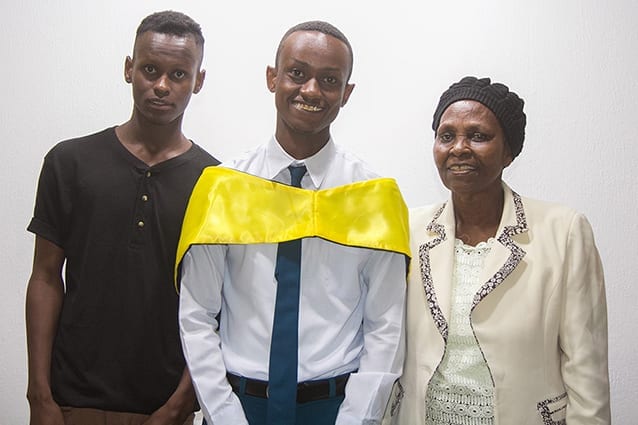
“Give me some examples of how you achieved your wish,” she would say. His mother always wanted to know how they were planning to achieve their dreams.
When Rickson began at St Jude’s, he recalls winning the Citizen Award for being a good class member. When his mother found out, she asked him, “What will you do next?” She did the same when he scooped the maths, science awards and even a music award.
When Rickson was finishing Standard 7, the end of primary school, his mother fell ill. He spent many hours conversing with her, trying to keep her spirits up. When he was 14, one of their morning conversations ended up being their last as his mother passed away that night. Overcome with disbelief and grief, it was Rickson’s Bibi (grandmother), Anifiambazi, who got him through that traumatic time.
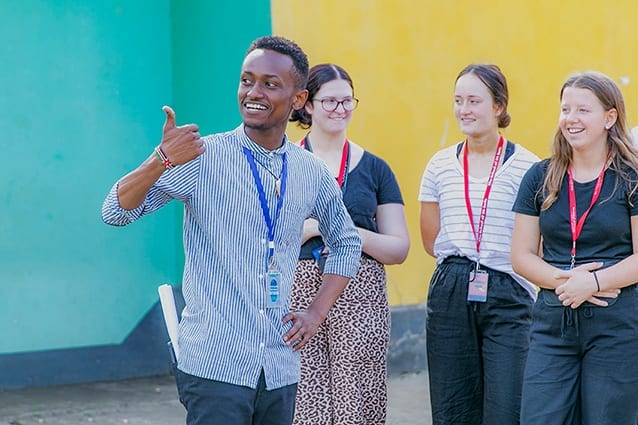
“My grandma became the person I could trust over anyone,” he says, adding that his grandmother only recently passed away unexpectedly.
“Every day with my grandmother was a lesson,” says Rickson. “I wasn’t sad on the day of her funeral, I was thankful for everything I had learnt.”
Rickson credits his resilience, determination and aspirational outlook on the lessons he learnt from his mother and grandmother. He also knows that, were it not for his place at St Jude’s, he would never have been able to dream of reaching the goals he now sets for himself.
“I’m looking forward to going to university and meeting even more new people. In my future I’d like to travel. I want to do my mum, brother and grandmother proud.”
If you’d like to know more about Rickson and his internship, be sure to listen to the latest episode of our podcast, Inside St Jude’s – Conversations with Gemma Sisia.